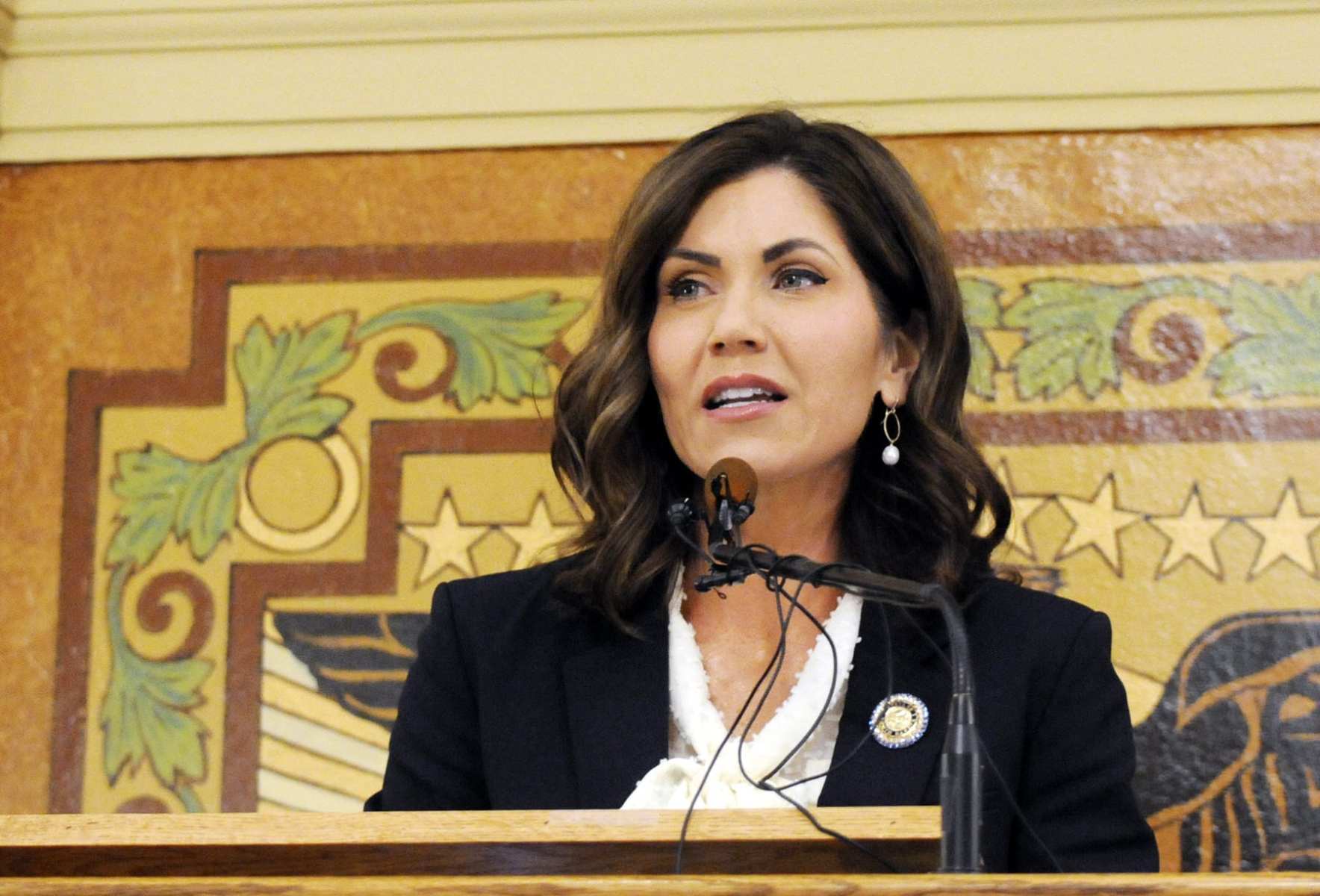South Dakota Gov. Kristi Noem vetoed a bill that would have barred transgender girls and women from playing sports with other women Monday, just days after she celebrated its passage. The state’s first woman governor still supported House Bill 1217, she said at a press conference, but didn’t sign it because she feared legal backlash from the National Collegiate Athletic Association.
“The NCAA is a private association,” Noem said. “That means they can do what they want to do. And even though I fundamentally disagree with them when it comes to this issue, if South Dakota passes a law that’s against their policy, they will likely take punitive action against us.”
Noem sent the bill back asking for exemptions for college athletics. But experts say that it’s likely not just legal issues that informed Noem’s decision. Time after time, states have considered anti-trans bathroom bills and ballot measures only to back down at the 11th hour over fears of nationwide boycotts.
According to Lee Badgett, professor of economics at the University of Massachusetts Amherst, businesses have historically punished states for anti-LGBTQ+ laws. After North Carolina passed a transgender bathroom bill in 2016, the state faced an estimated $3.76 billion in losses.
“In North Carolina, we saw businesses act on those threats, the businesses deciding not to locate new facilities or not to grow existing facilities,” Badgett said. “So, this is not not all talk. The businesses have taken action in many cases to clarify that they are very serious about this.”
Staring down an economic disaster, North Carolina repealed its anti-trans bill. Subsequent attempts to pass anti-trans bathroom bills in Anchorage, Alaska, and Massachusetts in 2018 failed at the ballot box. Anchorage’s tourism organization, Visit Anchorage, and the Anchorage Chamber of Commerce both opposed the referendum, stating that it threatened to eat into the city’s projected $115 million earnings in convention and meeting fees. Badgett adds that businesses successfully lobbied against implementing a bathroom measure in Texas.
State legislatures have produced a growing number of anti-LGBTQ+ bills, and almost all have failed. South Dakota, long seen as a testing ground for anti-LGBTQ+ legislation, killed an anti-transgender medical ban in January 2020 as lawmakers and business leaders worried that the measure would financially doom the state.
Experts say those fears are valid. It’s still difficult to predict what losses face states passing anti-trans bills in 2021, according to the National LGBT Chamber of Commerce.
“The hundreds of millions of dollars in lost revenues and opportunities in North Carolina, for example, will be a drop in the bucket against the total tax revenue, industry growth, and innovation lost in other states that use taxpayer dollars to discriminate against fellow red-blooded, tax-paying Americans, whether in the workplace, in schools, or anywhere else,” National LGBT Chamber of Commerce President Justin Nelson predicted.
Businesses have taken action in many cases to clarify that they are very serious about this.
Lee Badgett
More than 80 anti-transgender bills have been introduced this year, a record number, according to the Human Rights Campaign. Of those, only Mississippi has signed a bill into law. In South Dakota, Noem did sign a Religious Freedom Restoration Act, which LGBTQ+ advocates say greenlights discrimination against queer people under the guise of upholding religious liberty. However, that law has stirred little backlash, in part because it mirrors a federal law already on the books.
Anti-transgender bills have been met with swift resistance this year, however. More than 500 NCAA athletes signed a letter calling for association to pull events from states passing transgender athletic bans, a violation of the organization’s 2011 policy, which mandates that transgender women be allowed equal access to participation in sport, with few exceptions. The letter comes alongside vows from the ACLU to take states to court. More than 60 major companies, including Amazon, IKEA, Apple, Microsoft, and Nike, pledged to oppose the measures, presenting states with a clear choice: Choose between trans athletic bans and jobs.
Major companies can’t operate in states where LGBTQ+ people don’t want to work, Badgett said.
“I think they’re worried that these kinds of laws will make it harder for their business to recruit and retain the most productive employees and to make sure that people are able to feel included in the workplace,” Badgett said.
Beck Bailey, the director of the Workplace Equality Program at the Human Rights Campaign, said that North Carolina’s bathroom bill proved disastrous well beyond the state.
“I’m a transgender guy,” he said. “Using the men’s restroom at the Charlotte airport as I flew through North Carolina on my way somewhere else, it may be against the law. It directly impacted not only any employees [companies] had in the state, but any employees they had traveling through the state.”
Beck believes the response to transgender athletic bans has been more muted because fewer families are impacted. While many people may know a transgender person, less know a transgender kid and even fewer a trans kid playing sports.
The Associated Press asked lawmakers in the more than 20 states that have introduced such bills to produce examples of transgender athletes posing problems in their states. Most couldn’t. In South Dakota, advocates for transgender rights advocates were unable to locate transgender girls to testify against the athletic bill and had transgender boys speak against the measure instead, so it was not immediately clear who, if anyone, would be barred from competition.
Still, trans sports bills send the message that states are unwelcoming for LGBTQ+ people, and businesses don’t want that association, Badgett said. “I think they are also sometimes very sensitive to how consumers might perceive them for operating in states where discrimination exists.”
David Owen, head of the South Dakota Chamber of Commerce, called HB 1217 the “worst bill that passed this session.” In mid-March, state Sen. Reynold Nesiba said he worried Amazon would back out of plans to build a fulfillment center with 1,000 jobs in her city of Sioux Falls.
In the end, Noem was the one backing out, at least until lawmakers rework the bill, she said.
“We could pass a law, then we could get punished,” she said. “Then we could face expensive litigation at taxpayer expense and then, we could lose. We’d have nothing but a participation trophy to show for it.”






